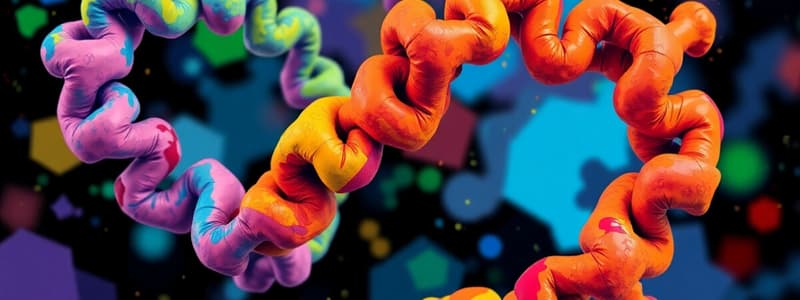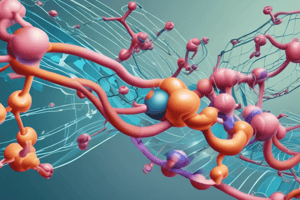Podcast
Questions and Answers
What is the typical repeat distance of strands in a β sheet?
What is the typical repeat distance of strands in a β sheet?
- 6.5 A◦
- 7.0 A◦ (correct)
- 5.1 A◦
- 6.0 A◦
What characterizes the connection of parallel strands in β sheets?
What characterizes the connection of parallel strands in β sheets?
- They require a slight left-handed twist.
- They require an extensive crossover connection. (correct)
- They are linked by simple loops.
- They are connected by a hydrogen bond network.
Which of the following describes the arrangement of polypeptide changes in reverse turns or β bends?
Which of the following describes the arrangement of polypeptide changes in reverse turns or β bends?
- They commonly occur in the interior of proteins.
- They usually involve four successive amino acid residues. (correct)
- They consist of a 160° flip between residues.
- They typically involve six successive amino acid residues.
What is the repeat distance for an α helix in a pair?
What is the repeat distance for an α helix in a pair?
What defines the primary structure of α keratin?
What defines the primary structure of α keratin?
How are the polypeptide chains in collagen characterized?
How are the polypeptide chains in collagen characterized?
What is the structure formed by two staggered rows of head-to-tail associated coiled coils?
What is the structure formed by two staggered rows of head-to-tail associated coiled coils?
Which of the following is true about the α keratin assembly?
Which of the following is true about the α keratin assembly?
What is the major component of connective tissues like bones and cartilage?
What is the major component of connective tissues like bones and cartilage?
In the coiled coil structure of α keratin, what is the predominant characteristic of residues a and d?
In the coiled coil structure of α keratin, what is the predominant characteristic of residues a and d?
What is the molecular mass of collagen typically measured at?
What is the molecular mass of collagen typically measured at?
Which enzyme is responsible for converting proline residues to hydroxyprolyl in collagen?
Which enzyme is responsible for converting proline residues to hydroxyprolyl in collagen?
What is the primary dietary deficiency that leads to scurvy?
What is the primary dietary deficiency that leads to scurvy?
Which of the following best describes the structural arrangement of collagen?
Which of the following best describes the structural arrangement of collagen?
Which amino acid comprises nearly one third of the residues in collagen?
Which amino acid comprises nearly one third of the residues in collagen?
What is a β bulge in the context of protein secondary structure?
What is a β bulge in the context of protein secondary structure?
How does the amino acid sequence affect protein secondary structure?
How does the amino acid sequence affect protein secondary structure?
According to the analysis by Chou and Fasman, what is true about certain residues in protein structures?
According to the analysis by Chou and Fasman, what is true about certain residues in protein structures?
What percentage range does proline and its hydroxy derivatives constitute in collagen?
What percentage range does proline and its hydroxy derivatives constitute in collagen?
What may cause an initial and final turn to frequently deviate from its ideal conformation in an α-helix?
What may cause an initial and final turn to frequently deviate from its ideal conformation in an α-helix?
What characterizes the primary structure of a protein?
What characterizes the primary structure of a protein?
Which structure of a protein is involved in interactions between side chains?
Which structure of a protein is involved in interactions between side chains?
What describes the secondary structure of a protein?
What describes the secondary structure of a protein?
What is the significance of peptide bonds in protein structure?
What is the significance of peptide bonds in protein structure?
In terms of torsion angles, what is the conformation when the polypeptide chain is fully extended?
In terms of torsion angles, what is the conformation when the polypeptide chain is fully extended?
What is the primary purpose of the Ramachandran diagram?
What is the primary purpose of the Ramachandran diagram?
What defines the quaternary structure of a protein?
What defines the quaternary structure of a protein?
Which residues are exceptions to the sterically allowed angles shown in the Ramachandran diagram?
Which residues are exceptions to the sterically allowed angles shown in the Ramachandran diagram?
What can cause steric interference in peptide groups?
What can cause steric interference in peptide groups?
What is the helical conformation of the α Helix in terms of residues per turn?
What is the helical conformation of the α Helix in terms of residues per turn?
What type of bonds primarily hold the secondary structure of proteins together?
What type of bonds primarily hold the secondary structure of proteins together?
In which type of β sheet do the hydrogen-bonded polypeptide chains run in opposite directions?
In which type of β sheet do the hydrogen-bonded polypeptide chains run in opposite directions?
Which statement accurately describes the torsion angles of a polypeptide backbone?
Which statement accurately describes the torsion angles of a polypeptide backbone?
Which of the following describes the rigid structure of the peptide group?
Which of the following describes the rigid structure of the peptide group?
What is the pitch of the α Helix?
What is the pitch of the α Helix?
What characterizes the side chains in β sheets?
What characterizes the side chains in β sheets?
What is indicated by the dashed lines in the α Helix structure?
What is indicated by the dashed lines in the α Helix structure?
Which type of β sheet has a rippled or pleated appearance?
Which type of β sheet has a rippled or pleated appearance?
Which statement about the α Helix is NOT true?
Which statement about the α Helix is NOT true?
Who was one of the early discoverers of the α Helix structure?
Who was one of the early discoverers of the α Helix structure?
Flashcards
Primary Structure
Primary Structure
The linear order of amino acids in a protein.
Secondary Structure
Secondary Structure
Local folding of the polypeptide chain.
Tertiary Structure
Tertiary Structure
The overall 3D shape of a single polypeptide chain.
Quaternary Structure
Quaternary Structure
Signup and view all the flashcards
Peptide Bond
Peptide Bond
Signup and view all the flashcards
Double Bond Character
Double Bond Character
Signup and view all the flashcards
Trans Conformation
Trans Conformation
Signup and view all the flashcards
Torsion Angles
Torsion Angles
Signup and view all the flashcards
Ramachandran Diagram
Ramachandran Diagram
Signup and view all the flashcards
Alpha Helix
Alpha Helix
Signup and view all the flashcards
Beta Sheet
Beta Sheet
Signup and view all the flashcards
Antiparallel Beta Sheet
Antiparallel Beta Sheet
Signup and view all the flashcards
Parallel Beta Sheet
Parallel Beta Sheet
Signup and view all the flashcards
Coiled Coil
Coiled Coil
Signup and view all the flashcards
Alpha Keratin
Alpha Keratin
Signup and view all the flashcards
Collagen
Collagen
Signup and view all the flashcards
Triple Helix
Triple Helix
Signup and view all the flashcards
Glycine
Glycine
Signup and view all the flashcards
Vitamin C
Vitamin C
Signup and view all the flashcards
Scurvy
Scurvy
Signup and view all the flashcards
Proline Hydroxylase
Proline Hydroxylase
Signup and view all the flashcards
β bulges
β bulges
Signup and view all the flashcards
Chou-Fasman Approach
Chou-Fasman Approach
Signup and view all the flashcards
Study Notes
Levels of Protein Structure
- Primary Structure: Linear sequence of amino acids in a protein.
- Secondary Structure: Local spatial arrangement of polypeptide backbone; characterized by coils and folds.
- Tertiary Structure: Three-dimensional configuration of an entire polypeptide, including side chains.
- Quaternary Structure: Spatial arrangement of multiple polypeptide chains, also known as subunits.
Peptide Bonds and Backbone Structure
- Peptide bonds connect amino acids, featuring ~40% double bond character due to resonance, resulting in rigid, planar structures.
- Peptide groups predominantly assume trans conformation, keeping successive Cα atoms on opposite sides of the peptide bond.
Torsion Angles and Ramachandran Diagram
- Backbone conformation described by torsion angles (Φ and ψ), both defined as 180° in fully extended conformation.
- The Ramachandran diagram displays allowed conformations of polypeptides; blue regions indicate sterically allowed angles, while green denotes more crowded limits.
Regular Secondary Structures
- Alpha Helix: Discovered by Linus Pauling, consists of 3.6 residues per turn with a favorable hydrogen-bonding pattern. Angles Φ = -57° and ψ = -47°, with a pitch of 5.4 Å.
- Beta Sheets: Composed of extended polypeptide chains, featuring hydrogen bonding between neighboring strands. Divided into antiparallel (chains run in opposite directions) and parallel (chains run in the same direction).
Structural Features of Beta Sheets
- Beta sheets exhibit a rippled or pleated appearance. Side chains extend perpendicularly to the sheet, with alternating R groups on opposite sides.
- Each strand has a two-residue repeat distance of 7.0 Å.
Coiled Coil Structure
- Alpha Keratin: Found in hair, nails, and skin, characterized by a coiled coil assembly due to the arrangement of nonpolar residues. The helices align to create a dimeric coiled coil structure.
Collagen Structure
- Collagen: Most abundant vertebrate protein; strong fibers in connective tissues (bones, skin, blood vessels).
- Composed of three polypeptide chains, with significant glycine content (~33%), as well as proline and hydroxyproline.
- Collagen forms a triple helix structure, twisted to achieve a right-handed superhelical formation.
Vitamin C and Prolyl Hydroxylase
- Proline residues in collagen are converted to hydroxyprolyl through a reaction requiring ascorbic acid (Vitamin C).
- A deficiency in Vitamin C leads to scurvy, a disease affecting collagen stability.
Influence of Sequence on Secondary Structure
- Amino acid sequence variations can distort ideal secondary structural conformations, resulting in occurrences like β bulges.
- Research by Chou and Fasman reveals certain residues favor specific secondary structures while disrupting others, assisting in predicting protein secondary structures based on amino acid sequences.
Studying That Suits You
Use AI to generate personalized quizzes and flashcards to suit your learning preferences.




